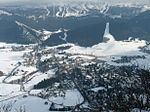Autrans
DauphinéFormer communes of IsèreIncomplete lists from April 2021Olympic Nordic combined venuesOlympic biathlon venues ... and 5 more
Olympic cross-country skiing venuesOlympic ski jumping venuesPages with French IPASports venues in IsèreVenues of the 1968 Winter Olympics

Autrans (French pronunciation: [otʁɑ̃]) is a former commune in the Isère department in the Rhône-Alpes region of south-eastern France. On 1 January 2016, it was merged into the new commune of Autrans-Méaudre-en-Vercors.At the 1968 Winter Olympics in Grenoble, it hosted the biathlon, cross-country skiing, Nordic combined, and the ski jumping normal hill events.The commune has been awarded one flower by the National Council of Towns and Villages in Bloom in the Competition of cities and villages in Bloom.
Excerpt from the Wikipedia article Autrans (License: CC BY-SA 3.0, Authors, Images).Autrans
Route de Gève, Autrans-Méaudre en Vercors
Geographical coordinates (GPS) Address Nearby Places Show on map
Geographical coordinates (GPS)
| Latitude | Longitude |
|---|---|
| N 45.176 ° | E 5.542 ° |
Address
Route de Gève 45
38880 Autrans-Méaudre en Vercors
Auvergne-Rhône-Alpes, France
Open on Google Maps









